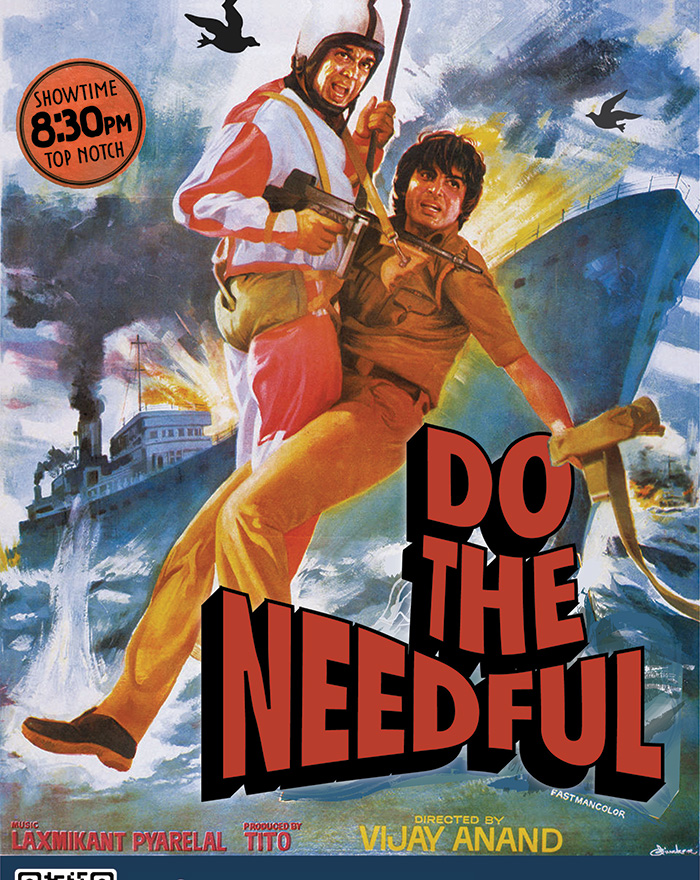
Do the Needful’s lineup is full of UChicago alumni and affiliates, and the group performs its Bollywood tributes across the city. (Photo courtesy Jamie Osborne)
A band of UChicago alumni and affiliates brings psych-rock daring to Bollywood classics.
Do the Needful has won what few rock bands have: the approval of their parents.
The band’s métier isn’t angsty anthems but Bollywood hits from the 1950s to early 1970s. Multigenerational audiences—including, on occasion, bandmembers’ very nostalgic parents—gather to hear them bring a swinging, bluesy spirit to “Ek Ladki Bheegi Bhagi Si,” from the 1958 film Chalti Ka Naam Gaadi, or channel the Strokes in their rendition of “Piya Tu Ab To Aaja,” from 1971’s Caravan, bansuri player Sonny Patel briefly setting aside his flute to sing into a megaphone. At a recent Do the Needful show at Chicago’s Old Town School of Folk Music, they threw it even further back: Singer Shruthi Kannan, AB’11, lent her intricate, wheeling vocals to a 19th-century Carnatic song by composer Swathi Thirunal Rama Varma.
Do the Needful—their name comes from an Indian English phrase meaning “to do what’s required”—puts on a great show. Its ranks are also bursting with UChicago affiliates. Singers Himabindu Poroori, AB’15, and Kannan are both alumni of the College; Kannan still performs in its South Asian Music Ensemble, as does Patel, a former debate coach at the Laboratory Schools. Another member, Mohit Manohar, is an assistant professor of art history specializing in South Asia. Drummer Thomas Gaulkin, AB’04 (Class of 2000), is an editor at the Bulletin of the Atomic Scientists. Bass responsibilities are split between Chris Kennedy, William H. Colvin Professor in the Department of Linguistics, and Jamie Sud, a PhD student in computer science. And Jamie Osborne, on guitar, is married to Michele Friedner, the chair of the Department of Comparative Human Development. (Do the Needful alumni include Tyler Williams, associate professor in South Asian Languages and Civilizations, and Shruti Vaidya, AM’19, PhD’24.)
Department of South Asian Languages and Civilizations Chair Rochona Majumdar, PhD’03, sees parallels between Do the Needful’s musical approach and current trends in Hindi-language film, the industry to which the “Bollywood” nickname specifically refers. As a scholar of Indian cinema, past and present, she’s become a diehard Do the Needful fan: She even won a Bollywood trivia contest hosted by the band a few years ago.
“Remixing has become pretty common in contemporary Bollywood,” says Majumdar, who is also George V. Bobrinskoy Professor in the Department of South Asian Languages and Civilizations, the Department of Cinema and Media Studies, and the College.

Though “Bollywood” is often used by Western audiences as a blanket term for Indian cinema, movies in other languages have their own monikers: “Gollywood” or “Dhollywood” for Gujarati films, “Tollywood” for Bengali films. The “golden era” of Hindi cinema the band focuses on developed alongside the modern state of India. The Indian film industry experienced a reset after the partition in 1947, becoming centralized in Mumbai (then still known as Bombay).
Back then in Mumbai, “Hindi was not the lingua franca—the two main languages were Gujarati and Marathi. But at a time when India’s national language was declared to be Hindi in the new constitution, it’s unsurprising that the national film industry would want to solidify its identity as Hindi,” Majumdar says.
It was also, she says, “a migrant industry.” Some of the period’s biggest stars were transplants. Composer R. D. Burman, whose hit songs are Do the Needful’s bread and butter, came to Bollywood by way of the Bengali film industry. Many of Do the Needful’s favorite songs feature Helen, a mononymic actress and dancer who escaped war-torn Burma as a child.
“The Venn diagram of the songs that she’s in and the songs that we really like is a perfect circle,” Osborne says.
Osborne, also the band’s lead arranger, first formed Do the Needful in New York, where he and Friedner lived while she taught at Stony Brook University. Osborne had nursed the notion of starting a punk-inspired Bollywood cover band ever since seeing Ghost World, the 2001 screen adaptation of the graphic novel by Daniel Clowes, LAB’79. The film’s opening sequence includes excerpts from “Jaan Pehechaan Ho,” a dance number from the 1965 film Gumnaam. Friedner’s research on deaf communities in India briefly relocated the couple to Bangalore in the later 2000s, by which point Osborne was really hooked.
In 2018 the New York iteration of Do the Needful released its debut album, Evergreen. After Friedner got a job at UChicago and their family relocated, Osborne set to work looking for new bandmates. He was introduced to Williams through Friedner. Osborne met Patel more fortuitously: Patel overheard him jamming at Promontory Point and recognized some Bollywood snippets.
From there the group swelled. Manohar learned about the band from Williams, Kannan from Poroori, and singer Divya Parameshwaran (the rare band member without a UChicago affiliation) asked to join the band after hearing them live. “It was refreshing. I hadn’t heard this music in a bar in all my time in America,” she says.
As the band’s ranks have grown, Do the Needful has branched out. They increasingly cover more ’90s tunes, many by A. R. Rahman—like “Chaiyya Chaiyya” from 1998’s Dil Se.., featuring Bollywood megastar Shah Rukh Khan, and “Minsara Poove” from 1999’s Padayappa. Patel says Do the Needful’s semiregular bookings at Skylark, a bar on Chicago’s near southwest side, have become their “experimental playground” for new material.
Soon that material may include originals, because intellectual property concerns have limited the band’s ability to post its covers on streaming services. Between the band members and their pooled talents, Osborne is confident they’ll be able to cook some things up. In the meantime, they’ll continue playing their very danceable tunes around Chicago.
